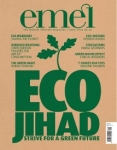Making Hajj Greener
Issue 57 June 2009
Dr Mawli Izzidien, 60, is an Iraqi senior lecturer in Islamic Studies at the University of Wales, Lampeter. An expert in religion and the environment, Dr Izzidien is a key player in the UN-backed Muslim Seven Year Plan, aiming to gear Muslims towards a greener lifestyle. He is part of the team that aims to create a greener Hajj.
Making the Hajj greener is an extremely important issue. The whole concept of the pilgrimage is about saving and making sacrifices. The prayer itself involves placing your head on the ground which establishes a connection to the earth. Through our submission to God in prayers we recognise our limits and must know we cannot abuse the earth as we wish; rather, we are its trustees.
Given that 60 percent of the Muslim world lives in poverty, the Islamic Seven Year Plan must charter ecological action that will benefit the poor. It is important to engage young people as they are our future. We also want to work towards printing the Qur’an on paper that comes from sustainable wood supplies, and we must evaluate our places of worship and their energy use. Creating a Green Hajj is a priority. Each year, around 100m plastic bottles are left on the Hajj sites. We aim to have after two years a Hajj free of plastic bottles and introduce environmentally friendly initiatives over the next 5-10 years to transform the Hajj into a recognised environmentally friendly pilgrimage. A media campaign and guide to a new green Hajj would be needed.
The packaging of food consumed by three million pilgrims is carelessly discarded. This has to change. With better education, we could address these issues, whether by giving the mutawwafs more power to clean up litter or instructing the guides who show the rites of the Hajj. People must understand that the action of not using plastic will better their pilgrimage, and help them enter the true spirit of Hajj. There is a close correlation between what is halal and what is environmentally friendly. Islam is an environmentally sound religion, and embedded within Islamic instructions are guidelines to live a life of stewardship. For instance, we must not waste water doing wudu. Fasting, zakat and all such rituals are environmentally sound.
I am helping to develop a halal green branding called Islamic & Environmental Labelling. This will categorise the environmental effects that goods have and each will be graded as to how green they are. People need to apply awareness to their daily life. If we continue to live the way we do now, we will contribute to the destruction of the environment. We think in a very materialistic way, and need to evaluate our lifestyle choices more. Consider the source of your food, the materials that you use. All of creation belongs to God, and we are His stewards. Once we enter the right mindset we will move in the right direction.
Click here to return to main article
Bookmark this |
|
Add to DIGG |
|
Add to del.icio.us |
|
Stumble this |
|
Share on Facebook |
|
Share this |
|
Send to a Friend |
|
Link to this |
|
Printer Friendly |
|
Print in plain text |
|


Comments
0 Comments